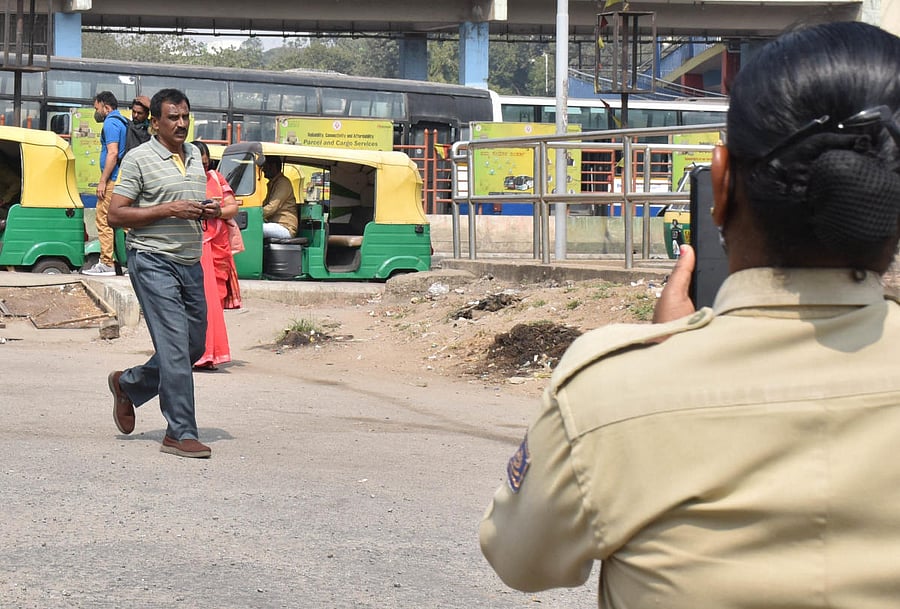
If you happen to be in the posh neighbourhoods of Indiranagar and Koramangala in Bengaluru, you will encounter blue-clad uniformed men patrolling the streets. They are not Karnataka police officers, but “guards” employed by 56 Secure, a company that calls itself India’s “first security subscription service.” For a monthly charge, 56 Secure’s security guards will patrol your neighbourhood, and visit your house regularly around the clock to make sure you have “dependable protection”. With their mobile app, you can also call these security guards in case of an emergency, or keep an eye on cameras that the company installs and operates for an additional charge.
56 Secure also seems to be training its security personnel, most if not all men, for what one might consider the functions of the local police. As a Deccan Herald story put it, “these baton-carrying men in uniform are trained to handle unruly behaviour, break-ins and thefts”. Through its social media accounts, the company boasts to the public with stories of its personnel stepping in – questioning and apprehending people that they are suspicious of, then calling the local police to wrap up the legal work.
Private security is not novel in urban India. Traditional security firms expanding their operations to wealthy “gated societies'' first normalised the privatisation of security of entire residential areas and compounds. The presence of security personnel in shopping malls has helped private security gain acceptance in what are ostensibly public spaces, yet private property.
56 Secure operates on a similar premise, of securing private property, but its personnel end up patrolling entire neighbourhoods. Regardless of the company’s investor-friendly claims of “automated security” and “artificial intelligence”, the central and most visible innovation of the company is not technological at all. Instead, 56 Secure’s aura of a new-age tech start-up is an attempt to add a veneer of respectability to what is essentially a nefarious legal and political innovation: the legitimisation of surveillance and policing by private companies on public property.
In November, 56 Secure guards accompanied police officers and entered the building I live in, claiming they were investigating a noise complaint, despite no one in my building being a 56 Secure customer. The company’s guards have also started to visit shops and businesses in Indiranagar, asking them to shut down at the legally-designated time. Being out late at night can mean getting suspicious stares from 56 Secure guards until one can implicitly or explicitly prove that they live or “belong” in the neighbourhood.
Despite being privileged enough to be an Indiranagar resident, but not their customer, I feel subject to privatised surveillance and policing without my consent. The surveillance is aimed at inhibiting “deviant” or “suspicious” behaviour in public spaces, which inevitably ends up being a tool for the enforcement of conservative social mores.
Most of the company’s customers are in wealthy and “respectable” neighbourhoods, and so is the sense of security that the company advertises. Consider “women safety”, which is being used by 56 Secure to demonstrate their social value. As Why Loiter? notes, the effects of surveillance and policing for this agenda become most pronounced on those who are perceived to be presenting a risk to privileged conceptions of safety and security – in this context, poor and/or Dalit men, implicitly assumed as the perpetrators of violence and crime. Such control not only fails to advance women’s free access to public spaces because it is conditional and comes at the cost of surveillance, it paves the way for other brutal exclusions. The constant surveillance and policing furthers segregation, and can contribute to marginalised populations’ constant fear of being watched, questioned or targeted.
The company’s identity and visual design is also revealing. The livery on 56 Secure’s vehicles and guards is in a distinct blue and white, synonymous with the police in urban America. The patrolling scooters are equipped with flashing red lights, which one instinctively associates with emergency services or the police, also raising questions of legal propriety (given that the Central Motor Vehicles regulations prohibit private vehicles from using such lights). This appropriation of the ‘police’ aesthetic is a deliberate attempt to signal legitimacy that we associate with public servants.
The distinction between them must be emphasised: while State authorities and the police can and should be criticised for perpetuating unjust surveillance and violence – on the lines of caste, religion, gender and otherwise – there is at least the prospect of holding them legally or politically accountable. Such a possibility is remote for a private company like 56 Secure, which is supported by multiple investors and residents of wealthy neighbourhoods, and whose actions may seemingly skirt to the appropriate side of the line of legality.
In this scenario, the role of the Karnataka government and Bengaluru Police must be questioned for a different reason – for acquiescing to, if not enabling, the operations of a company like 56 Secure. Public security and the rule of law are considered one of the core functions of a State. The State has instead allowed a private security firm to surveil and police the streets of Bengaluru.
In a world where public space is already rapidly shrinking and is being replaced by private places of consumption, the presence of 56 Secure and similar companies portends a dangerous shift in the dynamics of public spaces. A just and equal society recognises the importance of allowing all citizens to assert their rights over public property on equal terms. Then why should private companies like 56 Secure, which inevitably represent the interests and morality of the rich few, be allowed to control how public property is accessed and used?
Residents and residents’ associations in the neighbourhoods must collectively boycott these companies. The Karnataka government and Bengaluru Police must be held to account for forfeiting their role of ensuring public security and permitting private companies to damage the essence of public property: free and equitable access for all.
(The writer is a technologist and legal researcher based in Bengaluru)